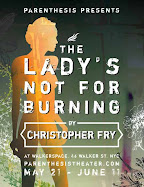It’s difficult for me to leave loose ends, and yet I’m going to. Two thousand and ten is coming to a close and there are three shows I saw in December that have not yet made an appearance in A Year of Plays – The Merchant of Venice, Featuring Loretta, and Blind Date. Provocative productions, all, and they each deserve the attention I’ve given so many other plays over the past fifteen months. Yet I find my writer’s heart has been yearning for a change.
For me, writing is a process that clarifies thought. Whatever matters occupy my mind, my thoughts on the subject gain their sharpest resolution only after I’ve shoved them through the churning mill of invention, composition, and revision. Yet since September, I’ve been occupied by a subject I’ve so far sequestered from this blog – which means for several months, I’ve left those thoughts unsharpened. I suppose I should have tended to them in a journal all this while, but over the past year I seem to have become monogamous to A Year of Plays. For better or worse, if I’m writing about theater, here is the lap in which I lay my head.
So what’s got me so occupied? Well, the play I’m producing, of course. Clearly. And yet for some reason, I didn’t allow myself to write about it. Well not just some reason. At first it was practical, I was waiting until I had all my ducks in a row before spilling the beans. But it soon became about perfection. I dreamed of orchestrating an impeccably coordinated launch of a flawlessly devised and perfectly executed marketing campaign that would blow the socks off the theater world. Good god, so that’s how you launch a theater company. But alas, while I have the ambition for perfection, I have not the teeth-gritting, gut-splitting, will of steel that makes perfection come to life. Not everyone can be the Black Swan. But it’s just as well. Life is messy, and first times are messier – just ask all the erstwhile virgins out there (ba-dum-dum). So now I free myself to gush like a giddy school girl after the prom and tell you all about this show. Orchestration will be for the masses. For you, you get the good stuff.
I am so excited about this play. It’s a lovely, lovely, GORGEOUS play. It’s hysterical and timely and political, and yet also overflows with soul-stirring, life-affirming beauty. It’s called…
The Lady’s Not for Burning
by Christopher Fry
… and it’s probably the best play you’ve hardly ever heard of. Set in an anachronistic fifteenth century (no no no, stay with me, it’s good, seriously), it’s about a soldier who comes to a town and asks to be hanged. The mayor and townspeople are toothlessly small-minded folk, unwilling to disturb the precarious order of their lives to handle such a request. A woman soon arrives to seek asylum from a gathering mob that has named her for a witch. The solider, the witch, and two others form a quartet of strangers to this seemingly innocuous town, who soon discover they must either escape with their lives, or die.
There is so much I want to write about this show. More about the play, which pulls of the remarkable feat of choosing optimism without denying cynicism. More about the playwright Christopher Fry, who in the 1950’s was the hottest thing since sliced bread until John Osborne came to town with his kitchen sink. About Parenthesis, the theater company I’m founding to present this show. About the nuts and bolts of producing on a showcase code budget in New York City. About striving to attach one’s personal goals to something greater than oneself – both to create sustainability and meaningful service, and to avoid drowning in one’s own reflection. About fear. And empowerment. And growing up. And on and on.
So that’s what I – and hopefully you – will have to look forward to in this next year of plays. And now would come the time that I wish you a happy new year, except I simply cannot go without at least saying something about The Merchant of Venice, Featuring Loretta, and Blind Date. So here is incredibly short shrift to three exciting and varied productions:
The Merchant of Venice – Exquisitely acted and Pacino did not disappoint. I feel it’s a hard play to present to modern audiences. This production confronts the anti-semitism (and also anti-feminist threads) with incredible smarts, yet those smarts still fight upstream against the prevailing current at the end of the play. Sometimes Shakespeare’s time and ours just don’t connect cleanly.
Featuring Loretta – One of the three Suburban Motel plays that Bryan Close’s Occam Rep produced earlier this month. Site-specifically staged in a conference room that felt exactly like a lower-rent motel, this play proved you absolutely DO NOT have to have an enormous budget to create successful theater. The actors killed with smart, funny, fully-realized performances, and the direction quickly gathered us up in a suspension of disbelief that allowed us to transport elsewhere. Really well done and I’m ecstatic that Bryan will be directing The Lady’s Not for Burning for Parenthesis. In fact, without Bryan handing me that play in the first place, there would be no Parenthesis. I owe him, and will continue to owe him, a debt of gratitude for that.
Blind Date – It was only here for a ten day try-out from Toronto, but mark my words it will be back. Probably one of the most alive nights I’ve spent in the theater in a long time. A hilarious, fully improvised show, where Mimi the Clown selects a member of the audience to be her blind date for the evening. I have never squealed as loud or bit my hands as hard as when I watched our audience member Desmond swoop in to steal a kiss from under Mimi’s adorable, round, red nose. Classic.
And that wraps up 2010. Happy New Year, everyone. May the next year see all your dreams come true.




